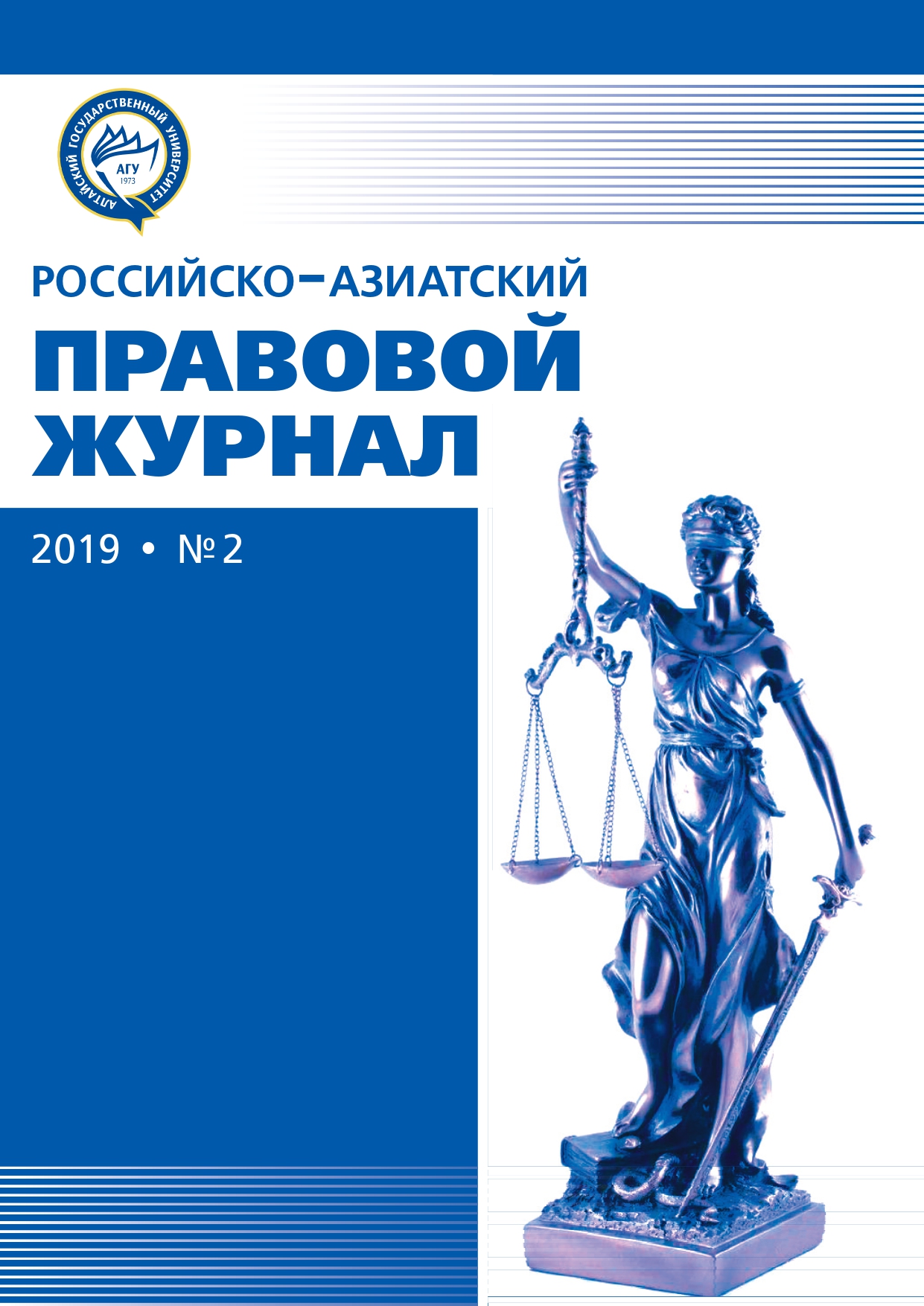SOME ISSUES OF LEGAL REGULATION OF INTERNATIONAL SCIENTIFIC AND TECHNICAL COOPERATION IN THE MODERN ECONOMY
УДК 341.23 ББК 67.91
Abstract
The article Reviews the history of legal regulation of international scientific and technical cooperationin the context of the development of the Soviet and modern economy. The influence of the economy on thedynamics of international legal regulation of scientific and technical partnership is shown.
Downloads
References
Устав ООН // Организация Объединенных Наций. URL: http://www.un.org/ru/charter-unitednations/index.html (дата доступа: 07.06.2019).
Декларация о принципах международного права, касающихся дружественных отношений и сотрудничества между государствами в соответствии с Уставом Организации Объединенных Наций // Организация Объединенных Наций. URL: http://www.un.org/ru/documents/decl_conv/declarations/intlaw_principles.shtml. (дата доступа: 07.06.2019).
Гумеров Л.А. Правовое регулирование научно-технического сотрудничества государств-участников СНГ : автореф. дис. … канд. юрид. наук. Казань, 2001. 22 с
Международное право : учебник / отв. ред. Ю.М. Колосов, Э.С. Кривчикова. М., 2000. 720 с.
Казарина Н.В. Правовое регулирование международного научно-технического сотрудничества // Беларусь в современном мире : материалы XVI Междунар. науч. конф., посвящ. 96-летию образования Белорусского гос. ун-та, Минск, 25 окт. 2017 г. = Беларусь у сучасным свеце: матэрыялы XVI Міжнар. навук. канф., прысвеч. 96-годдзю заснавання Беларус. дзярж. ун-та, Мінск, 25 кастр. 2017 г. Минск, 2017. С. 169–171.
Степаненко С.И. Научно-техническое сотрудничество социалистических стран. М., 1962. 88 с.
Экономическая энциклопедия. Политическая экономия / гл. ред. А.М. Румянцев. Т. 3. М., 1979. 624 с.
Конюшко В.А. Научно-техническая интеграция стран-членов СЭВ и их сотрудничество в области научной и технической информации : метод. пособие. М., 1984. 31 с.
Зорина О.О. Оценка сетевого взаимодействия компаний // Актуальные вопросы экономических наук : материалы LVI Международной научно-практической конференции / под общ. ред. С.С. Чернова. Челябинск, 2017. С. 8–13.
Назарчук А.В. Сетевое общество и его философское осмысление // Рождение коллективного
разума: О новых законах сетевого социума и сетевой экономики и об их влиянии на поведение человека. Великая трансформация третьего тысячелетия / под ред. Б.Б. Славина. М., 2014. Гл. 2. С. 40–53.
Lipnack J., Stamps J. The age of the network: Organizing principles for the 21st century. URL: https://books.google.by/books?id=aOv_CE14GBMC&lpg=PR7&dq=lipnack%20stamps&lr&hl=ru&pg =PR7#v=onepage&q=lipnack%20stamps&f=false. Date of access: 25.01.2018.
Дудинская С.И. «Сетевые» модели современного миропорядка // V научно-практическая интернет-конференция «Альянс наук: ученый — ученому» (25–26 февраля 2010 г.). URL: http://www.confcontact.com/2010alyans/ist_dudin.php (дата доступа: 12.01.2018).
Шерешева М.Ю. Межорганизационные сети в системе форм функционирования современных отраслевых рынков : автореф. дис. … д-ра экон. наук. М., 2006. 53 с.
Russian-Asian Law Journal is a golden publisher, as we allow self-archiving, but most importantly we are fully transparent about your rights.
Authors may present and discuss their findings ahead of publication: at scientific conferences, on preprint servers, in public databases, and in blogs, wikis, tweets, and other informal communication channels.
Russian-Asian Law Journal allows authors to deposit manuscripts (currently under review or those for intended submission) in non-commercial, pre-print servers such as ArXiv.
Authors who publish with this journal agree to the following terms:
- Authors retain copyright and grant the journal right of first publication with the work simultaneously licensed under a Creative Commons Attribution License that allows others to share the work with an acknowledgement of the work's authorship and initial publication in this journal.
- Authors are able to enter into separate, additional contractual arrangements for the non-exclusive distribution of the journal's published version of the work (e.g., post it to an institutional repository or publish it in a book), with an acknowledgement of its initial publication in this journal.
- Authors are permitted and encouraged to post their work online (e.g., in institutional repositories or on their website) prior to and during the submission process, as it can lead to productive exchanges, as well as earlier and greater citation of published work (See The Effect of Open Access).








